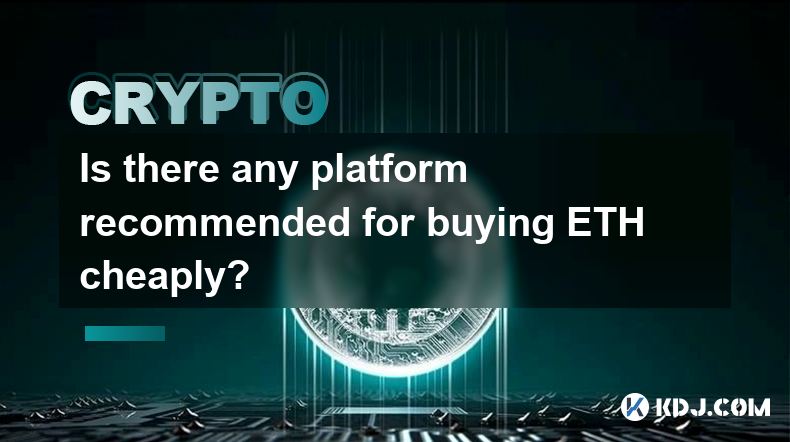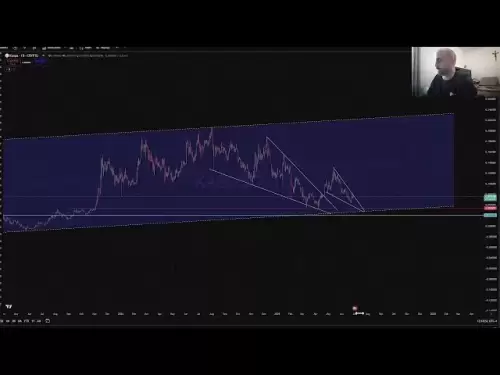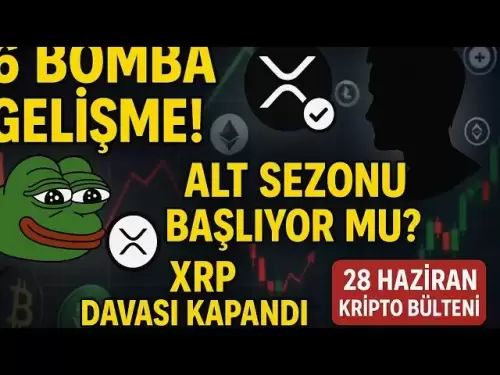-
 Bitcoin
Bitcoin $107,341.7259
0.15% -
 Ethereum
Ethereum $2,438.6204
0.70% -
 Tether USDt
Tether USDt $1.0003
-0.02% -
 XRP
XRP $2.1866
1.94% -
 BNB
BNB $649.0952
0.36% -
 Solana
Solana $150.9602
5.63% -
 USDC
USDC $0.9999
0.00% -
 TRON
TRON $0.2742
0.40% -
 Dogecoin
Dogecoin $0.1645
1.93% -
 Cardano
Cardano $0.5669
1.18% -
 Hyperliquid
Hyperliquid $37.8286
4.19% -
 Bitcoin Cash
Bitcoin Cash $491.4669
-2.74% -
 Sui
Sui $2.8150
3.06% -
 Chainlink
Chainlink $13.4184
2.91% -
 UNUS SED LEO
UNUS SED LEO $9.0809
0.27% -
 Avalanche
Avalanche $18.0295
2.60% -
 Stellar
Stellar $0.2396
1.19% -
 Toncoin
Toncoin $2.8587
0.13% -
 Shiba Inu
Shiba Inu $0.0...01160
2.59% -
 Litecoin
Litecoin $86.4192
1.45% -
 Hedera
Hedera $0.1486
1.19% -
 Monero
Monero $308.4324
0.87% -
 Polkadot
Polkadot $3.4202
1.43% -
 Bitget Token
Bitget Token $4.6436
-0.34% -
 Dai
Dai $0.9998
-0.02% -
 Ethena USDe
Ethena USDe $1.0002
0.00% -
 Uniswap
Uniswap $7.1527
3.29% -
 Pi
Pi $0.5357
-8.45% -
 Pepe
Pepe $0.0...09588
4.61% -
 Aave
Aave $259.9759
0.81%
Is there any platform recommended for buying ETH cheaply?
To buy ETH at competitive prices, compare fees and features across platforms like Coinbase, Kraken, and Uniswap, and use strategies like limit orders and stablecoin purchases.
Apr 02, 2025 at 05:43 am

Finding the Best Platforms to Buy ETH at Competitive Prices
Buying Ether (ETH), the native cryptocurrency of the Ethereum blockchain, can seem daunting with numerous exchanges and platforms vying for your attention. The price of ETH, like all cryptocurrencies, fluctuates constantly, making finding the cheapest option a dynamic process. There isn't one single "cheapest" platform, as fees, trading volumes, and even your location can significantly impact the final cost. However, we can explore several reputable platforms and strategies to help you acquire ETH at competitive prices.
Choosing a platform depends on several factors. Consider the fees charged (both trading fees and deposit/withdrawal fees), the available payment methods, the platform's security features, and its user-friendliness. Lower fees are always attractive, but security and reliability should never be compromised. Some platforms might offer lower trading fees but higher withdrawal fees, so a thorough comparison is essential.
Reputable Platforms for ETH Purchases
Several established and reputable platforms offer ETH trading. These include centralized exchanges like Coinbase, Kraken, Binance, and Gemini. Decentralized exchanges (DEXs) like Uniswap and SushiSwap also provide options, but they often require a higher level of technical expertise. Each platform has its own fee structure and features.
- Coinbase: Known for its user-friendly interface and robust security measures, Coinbase is a good option for beginners. However, its fees might be slightly higher than some competitors.
- Kraken: Kraken offers a wider range of cryptocurrencies and generally competitive fees, appealing to more experienced traders. It boasts advanced charting tools and a professional trading interface.
- Binance: Binance is one of the largest cryptocurrency exchanges globally, offering very low trading fees and a vast selection of cryptocurrencies. However, its interface can be overwhelming for beginners.
- Gemini: Gemini prioritizes security and regulation, making it a suitable choice for users who value a secure and compliant platform. Its fees are generally competitive.
- Uniswap (DEX): Uniswap allows for decentralized ETH trading, eliminating reliance on a centralized entity. However, it requires a basic understanding of decentralized finance (DeFi) and using a wallet.
- SushiSwap (DEX): Similar to Uniswap, SushiSwap is a DEX offering decentralized ETH trading with potentially lower fees but a steeper learning curve.
Remember that fees can vary based on trading volume, payment methods, and the specific cryptocurrency pair. Always check the current fee structure before making a purchase. Furthermore, consider the spread, the difference between the buy and sell price, as a wider spread effectively increases your cost.
Minimizing ETH Purchase Costs: Strategies and Considerations
Beyond choosing the right platform, several strategies can help minimize your ETH purchase costs:
- Compare Prices Across Multiple Platforms: Before buying, check the price of ETH across several exchanges. Slight differences can add up, especially for larger purchases.
- Utilize Limit Orders: Instead of buying at the current market price, use limit orders to specify the maximum price you're willing to pay. This allows you to potentially purchase ETH at a lower price if the market dips.
- Take Advantage of Promotions and Discounts: Some platforms occasionally offer promotions or discounts on trading fees or offer lower fees for higher trading volumes. Keep an eye out for these opportunities.
- Consider Using a Stablecoin: Purchasing ETH with a stablecoin like USDC or USDT can sometimes be more cost-effective than using fiat currency directly, as stablecoin trading pairs often have lower fees.
- Batch Purchases: Purchasing ETH in larger quantities can sometimes result in lower per-unit costs due to reduced transaction fees, but only do this if you can comfortably afford it.
- Timing the Market (Risky): Attempting to time the market to buy ETH at its lowest point is highly speculative and risky. Market fluctuations are unpredictable, and you could end up paying more than expected.
Understanding Transaction Fees and Hidden Costs
Understanding the different types of fees involved is crucial to minimizing your overall costs.
- Trading Fees: These are fees charged for executing a trade on the exchange. They vary depending on the platform and your trading volume.
- Deposit Fees: Some platforms charge fees for depositing funds, especially when using certain payment methods.
- Withdrawal Fees: Fees are usually charged for withdrawing your ETH from the exchange to your personal wallet.
- Network Fees (Gas Fees): When using DEXs or interacting with Ethereum smart contracts, you'll incur network fees (gas fees), which compensate miners for processing your transaction. These fees are volatile and depend on network congestion.
Security Considerations When Buying ETH
Security should always be a top priority. Choose reputable and well-established platforms with a proven track record of security. Never share your private keys or seed phrases with anyone. Use strong passwords and enable two-factor authentication (2FA) wherever possible. Consider using a hardware wallet for storing your ETH long-term for enhanced security.
Frequently Asked Questions
Q: What is the cheapest way to buy ETH?
A: There's no single "cheapest" way. The cost depends on the platform, fees, payment method, and current market conditions. Comparing prices across multiple exchanges and using strategies like limit orders can help minimize costs.
Q: Are DEXs cheaper than centralized exchanges (CEXs)?
A: DEXs can offer lower trading fees, but they also involve network fees (gas fees) and may have a steeper learning curve. CEXs generally have simpler interfaces but may have higher fees.
Q: What are the risks of buying ETH?
A: The cryptocurrency market is volatile, and the price of ETH can fluctuate significantly. There's a risk of losing money if the price drops after you buy. Security risks also exist, such as platform hacks or personal wallet compromise.
Q: Which platform is best for beginners?
A: Coinbase and Gemini are generally considered user-friendly platforms suitable for beginners due to their intuitive interfaces and robust security measures. However, always research before choosing a platform.
Q: How do I store my ETH safely after purchasing?
A: After purchasing ETH, transfer it to a secure wallet, preferably a hardware wallet like Ledger or Trezor, for long-term storage. Avoid storing large amounts of ETH on exchanges.
Disclaimer:info@kdj.com
The information provided is not trading advice. kdj.com does not assume any responsibility for any investments made based on the information provided in this article. Cryptocurrencies are highly volatile and it is highly recommended that you invest with caution after thorough research!
If you believe that the content used on this website infringes your copyright, please contact us immediately (info@kdj.com) and we will delete it promptly.
- Trump, Bitcoin, and Peter Schiff: A New York Minute on Crypto Chaos
- 2025-06-29 12:30:12
- BTC Price, BlackRock ETF, Fed Signals: Decoding the Crypto Crossroads
- 2025-06-29 12:30:12
- SEI Price Skyrockets Amid ETF Hype and Bullish Uptrend: What's Next?
- 2025-06-29 12:50:11
- Bitcoin Mining, Cryptocurrency, and Blockchain: A New York State of Mind
- 2025-06-29 13:10:11
- Pengu, Altcoin, Leads Charge: What's Driving the Meme Coin Frenzy?
- 2025-06-29 13:30:12
- Bitcoin Market Navigates the Neutral Zone: An On-Chain Data Perspective
- 2025-06-29 13:50:12
Related knowledge

How to customize USDT TRC20 mining fees? Flexible adjustment tutorial
Jun 13,2025 at 01:42am
Understanding USDT TRC20 Mining FeesMining fees on the TRON (TRC20) network are essential for processing transactions. Unlike Bitcoin or Ethereum, where miners directly validate transactions, TRON uses a delegated proof-of-stake (DPoS) mechanism. However, users still need to pay bandwidth and energy fees, which are collectively referred to as 'mining fe...

USDT TRC20 transaction is stuck? Solution summary
Jun 14,2025 at 11:15pm
Understanding USDT TRC20 TransactionsWhen users mention that a USDT TRC20 transaction is stuck, they typically refer to a situation where the transfer of Tether (USDT) on the TRON blockchain has not been confirmed for an extended period. This issue may arise due to various reasons such as network congestion, insufficient transaction fees, or wallet-rela...

How to cancel USDT TRC20 unconfirmed transactions? Operation guide
Jun 13,2025 at 11:01pm
Understanding USDT TRC20 Unconfirmed TransactionsWhen dealing with USDT TRC20 transactions, it’s crucial to understand what an unconfirmed transaction means. An unconfirmed transaction is one that has been broadcasted to the blockchain network but hasn’t yet been included in a block. This typically occurs due to low transaction fees or network congestio...

How to check USDT TRC20 balance? Introduction to multiple query methods
Jun 21,2025 at 02:42am
Understanding USDT TRC20 and Its ImportanceUSDT (Tether) is one of the most widely used stablecoins in the cryptocurrency market. It exists on multiple blockchain networks, including TRC20, which operates on the Tron (TRX) network. Checking your USDT TRC20 balance accurately is crucial for users who hold or transact with this asset. Whether you're sendi...

What to do if USDT TRC20 transfers are congested? Speed up trading skills
Jun 13,2025 at 09:56am
Understanding USDT TRC20 Transfer CongestionWhen transferring USDT TRC20, users may occasionally experience delays or congestion. This typically occurs due to network overload on the TRON blockchain, which hosts the TRC20 version of Tether. Unlike the ERC20 variant (which runs on Ethereum), TRC20 transactions are generally faster and cheaper, but during...

The relationship between USDT TRC20 and TRON chain: technical background analysis
Jun 12,2025 at 01:28pm
What is USDT TRC20?USDT TRC20 refers to the Tether (USDT) token issued on the TRON blockchain using the TRC-20 standard. Unlike the more commonly known ERC-20 version of USDT (which runs on Ethereum), the TRC-20 variant leverages the TRON network's infrastructure for faster and cheaper transactions. The emergence of this version came as part of Tether’s...

How to customize USDT TRC20 mining fees? Flexible adjustment tutorial
Jun 13,2025 at 01:42am
Understanding USDT TRC20 Mining FeesMining fees on the TRON (TRC20) network are essential for processing transactions. Unlike Bitcoin or Ethereum, where miners directly validate transactions, TRON uses a delegated proof-of-stake (DPoS) mechanism. However, users still need to pay bandwidth and energy fees, which are collectively referred to as 'mining fe...

USDT TRC20 transaction is stuck? Solution summary
Jun 14,2025 at 11:15pm
Understanding USDT TRC20 TransactionsWhen users mention that a USDT TRC20 transaction is stuck, they typically refer to a situation where the transfer of Tether (USDT) on the TRON blockchain has not been confirmed for an extended period. This issue may arise due to various reasons such as network congestion, insufficient transaction fees, or wallet-rela...

How to cancel USDT TRC20 unconfirmed transactions? Operation guide
Jun 13,2025 at 11:01pm
Understanding USDT TRC20 Unconfirmed TransactionsWhen dealing with USDT TRC20 transactions, it’s crucial to understand what an unconfirmed transaction means. An unconfirmed transaction is one that has been broadcasted to the blockchain network but hasn’t yet been included in a block. This typically occurs due to low transaction fees or network congestio...

How to check USDT TRC20 balance? Introduction to multiple query methods
Jun 21,2025 at 02:42am
Understanding USDT TRC20 and Its ImportanceUSDT (Tether) is one of the most widely used stablecoins in the cryptocurrency market. It exists on multiple blockchain networks, including TRC20, which operates on the Tron (TRX) network. Checking your USDT TRC20 balance accurately is crucial for users who hold or transact with this asset. Whether you're sendi...

What to do if USDT TRC20 transfers are congested? Speed up trading skills
Jun 13,2025 at 09:56am
Understanding USDT TRC20 Transfer CongestionWhen transferring USDT TRC20, users may occasionally experience delays or congestion. This typically occurs due to network overload on the TRON blockchain, which hosts the TRC20 version of Tether. Unlike the ERC20 variant (which runs on Ethereum), TRC20 transactions are generally faster and cheaper, but during...

The relationship between USDT TRC20 and TRON chain: technical background analysis
Jun 12,2025 at 01:28pm
What is USDT TRC20?USDT TRC20 refers to the Tether (USDT) token issued on the TRON blockchain using the TRC-20 standard. Unlike the more commonly known ERC-20 version of USDT (which runs on Ethereum), the TRC-20 variant leverages the TRON network's infrastructure for faster and cheaper transactions. The emergence of this version came as part of Tether’s...
See all articles

























































































